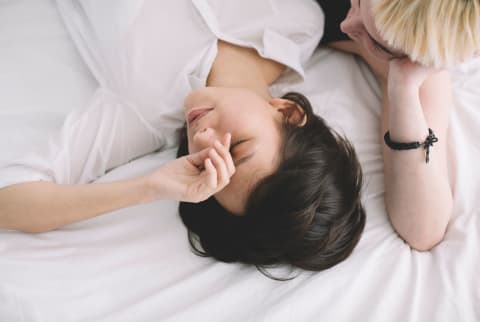Advertisement
Is Lack Of Sleep Getting In The Way Of Your Sex Life? Here's What A Psychologist Says


What does the science actually tell us about the costs and benefits of sleeping together or apart? According to several studies, when sleep is measured objectively—particularly using wrist-worn devices called actigraphs that measure movement during sleep—people generally sleep worse with a partner.
How sharing a bed affects sleep.
Early on in my career, I had the opportunity to meet with Robert Meadows, Ph.D., a sociologist from the University of Surrey who was doing some fascinating work on the shared nature of sleep. In one study, in which he measured couples' sleep using actigraphy1, he and his colleagues showed that "one-third of the variance in sleep is accounted for at the couple level." In other words, when looking at an individual's sleep pattern through the night, 30% of that individual's sleep (or lack thereof) is influenced by the bed partner's sleep.
And in Meadow's words, "You can no longer ignore the impact of the bed partner on one's sleep. Interdependence may be the defining feature of relationships, and in societies where it is common for adults to share a bed, it is also perhaps the defining feature of sleep."
Sharing a bed can be particularly detrimental to the bed partner's sleep if the other partner is a snorer—as you can likely imagine. In fact, if you sleep with a snorer, you can blame your partner for up to 50% of sleep disruptions. Given that men are more likely to be snorers than women, this may also be why several studies have shown that women's sleep is more disturbed than men's when men and women share a bed.
Sleep loss can set us up for greater emotional distancing and negative conflict tactics within relationships, but I would be remiss if I didn't also mention how sleep loss can negatively affect our physical connection and intimacy.
How lack of sleep interferes with sex.
According to sex researchers, "feeling too tired" is one of the most frequently heard excuses for skipping out on sex. While it may, for some, feel like no more than an excuse, there is some converging science to show that sleep loss can hurt our sex lives.
For example, a University of Michigan study of women's sleep and sexual activity found that when women slept poorly they reported less sexual desire and less frequent sexual activity the next day. And it's not just women's sex drive that's affected by sleep loss. A 2011 study published in the preeminent medical journal Journal of the American Medical Association found that men who were restricted to five hours of sleep for eight consecutive nights had a 10 to 15% reduction in testosterone levels2, which can have a big impact on sex drive. To put that into context, that level of decline in testosterone is about the equivalent of aging a man by 10 to 15 years.
A more recent study showed a positive, linear relationship between sleep duration and testicular volume3. In other words, the more sleep the men were getting, the larger the testes. Now we've all heard that size doesn't matter, but when it comes to male fertility, size actually does matter. There is a direct correlation between testes size and sperm count.
The takeaway.
For couples looking to enhance their sex life as well as those seeking to expand their family, it's time to start prioritizing sleep.